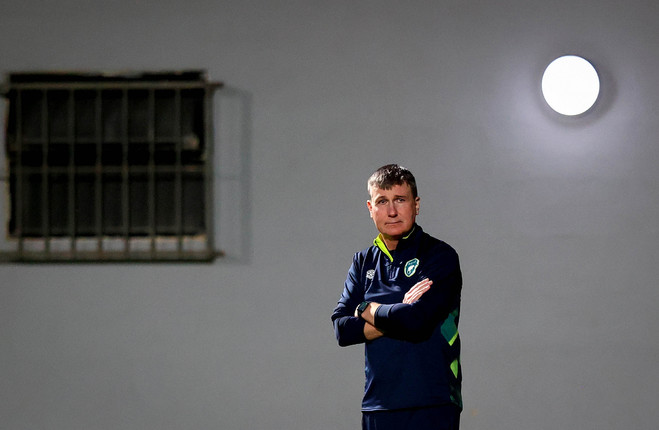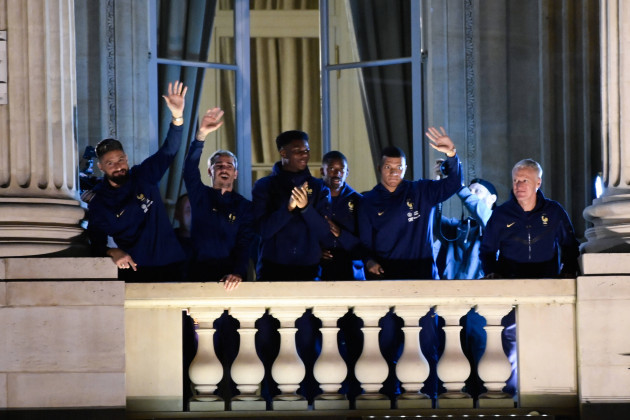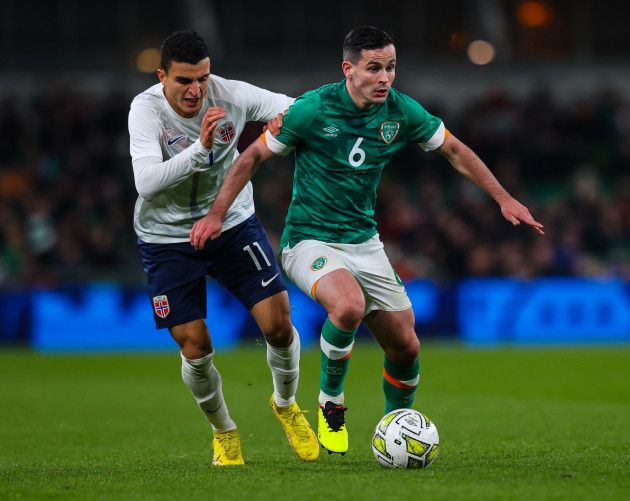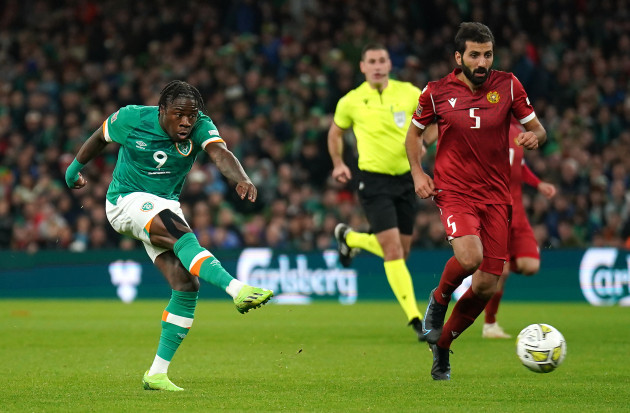THE PEOPLE GATHERED and the people sang.
Paris was a place of joy, despite France’s penalty shootout defeat to Argentina in the World Cup final.
The country’s beaten heroes, dethroned world champions, appeared on a balcony at the Hotel Crillon looking out on Place de la Concord, the site of executions during the French Revolution.
But this was a celebration, nobody was baying for blood.
People climbed statues and monuments and sat on the shoulders of their loved ones waving the blue, white and red tricolour. Fireworks lit up the night’s sky as the France players soaked in the atmosphere with smiles. This was a kind of happiness that probably felt unimaginable only hours beforehand.
This is not what Ireland wanted to see.
This unity, understanding and positivity is the last thing we need given that France will be the first opponents in competitive action for the opening European Championship qualifier on 27 March.
They will, of course, be hurting that they were unable to successfully defend their crown. But instead of recrimination and rancour, there is a worrying sensibility about the French team, and what it could still be capable of.
Twelve of those who featured in the final were 25 or under, including talisman Kylian Mbappe who celebrated his 24th birthday three days after his hat-trick in the showpiece.
In the aftermath, manager Didier Deschamps also said on French television that he would have to “see what happens” regarding his future, and it’s reported that he will have a meeting with the new French Football Federation president, Noël Le Graët, in early January to finalise plans.
Regardless, France are in excellent shape and there is unlikely to be any World Cup hangover. The talent they have coming through is far too young and fearless to let disappointment fester.
All of this matters because, for Stephen Kenny and Ireland, it seems difficult to truly evaluate the challenges ahead in 2023 without examining how the initial French clash will set the tone.
It is a visit that has the potential to be another catalyst for a debate on the manager’s future, or ignite flames of optimism beyond reason.
It feels as though Ireland are continually on the brink of either turning a corner or crashing straight into a wall. The pendulum is likely to swing dramatically one way or the other come the spring.
And, in France, we should all have our eyes open to what is straight ahead.
Maintaining any semblance of positivity beyond March is crucial, however it comes about.
Ireland have yet to win the opening game of the three full campaigns which Kenny has been in charge of. A 1-1 draw away to Bulgaria in September 2020 at the beginning of the Nations League was followed by a 3-2 defeat in Serbia at the start of World Cup qualifying.
Most recently, losing 1-0 away to Armenia in the Nations League was another significant setback at a point where the expectation was to see Ireland kick on, especially given the overhaul of players which had taken place.
Peppered throughout Kenny’s tenure have been moments of promise and excitement interwoven with despair and frustration.
Now it is about being capable of delivering a consistency to performances that allows for a steady sense of optimism – and results – rather than an eternal fluctuation.
That doesn’t mean consistency is found in rigid systems or structures.
Striking the balance between using the now-favoured 3-5-2 and variations of 4-2-3-1/4-4-1-1 will, you have to imagine, be imperative.
Even on Ireland’s best day they will still remain prisoners to fortune against France – let alone the Netherlands who also find themselves in Group B and come to Dublin in September having provided moments that enthralled until their dramatic World Cup quarter-final exit to eventual champions Argentina.
The presence of those two countries means Kenny cannot be judged solely on whether qualification is secured, but rather if Ireland emerge as a worthy foe for the elite who show they are capable of edging the games in the balance.
Not to mention avoiding the kind of two-minute mini meltdown against Armenia last September which resulted in the concession of two goals and required an injury-time penalty to salvage victory.
September feels an awfully long way away, especially so considering Ireland will have actually completed their home and away fixtures with the French, and have already faced a trip to Greece on 16 June followed by a home clash with Gibraltar three days later.
By the time of that date with the Dutch, Ireland’s path to Germany will either be at a dead end or meandering to a potentially career-defining crescendo for Kenny, and some of his players.
There will be some who, when fit, know they are now cornerstones of his team.
Gavin Bazunu, John Egan, Nathan Collins, Matt Doherty and Josh Cullen would be the names now considered a surprise if omitted from any starting XI.
Michael Obafemi and Troy Parrott looked to be forging the kind of effective partnership in attack that would also propel them into that same bracket.
But their respective struggles at club level show exactly why international teams with limited resources face such challenges, and rely on timing to maximise opportunity.
Parrott scored his first goal on loan with Preston North End in the Championship against Norwich City back on 8 October. He suffered a hamstring injury in the process of doing so and has been ruled out until at least this month.
Fifteen days after that bad fortune, Obafemi found the net for Swansea City in a 2-0 win over rivals Cardiff City. It was the 22-year-old’s third goal of the season, while a disappointing display in the friendly defeat to Norway in November highlights the see-saw nature of most Irish players’ form.
Obafemi played a key role in two of Ireland’s best goals in 2022 – both of which came in the most comprehensive performance of Kenny’s tenure.
The 3-0 win over Scotland last summer saw Obafemi and Parrott link superbly for the latter to score, before the former Southampton striker then swivelled and shot from long range to leave Craig Gordon with no chance.
Bottling the tenacity, anger and ruthlessness in front of goal from that display is pivotal if Ireland are to somehow start 2023 with a performance that will offer hope of a brighter future over the next 12 months.




